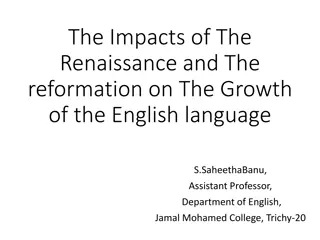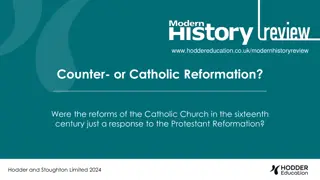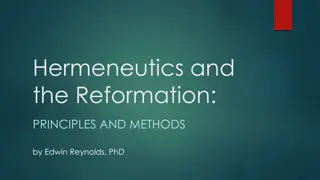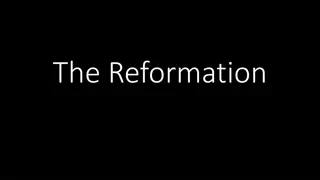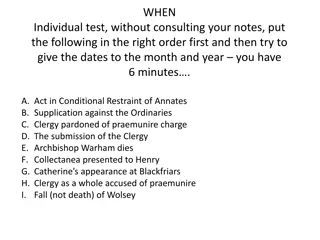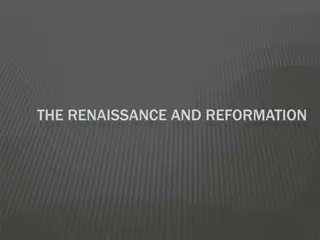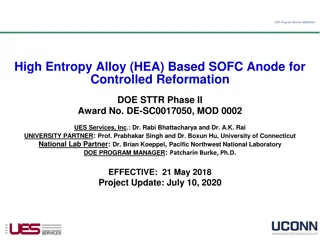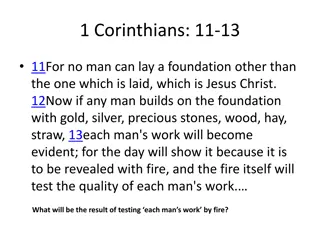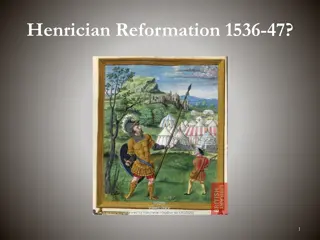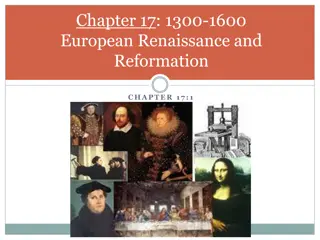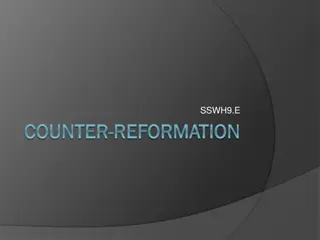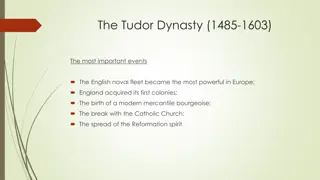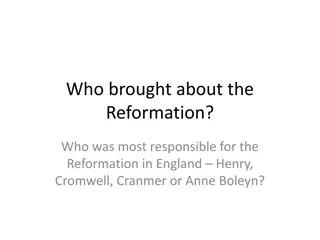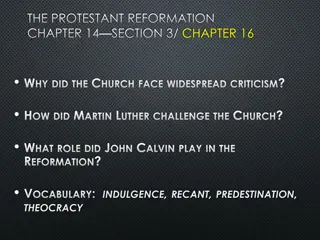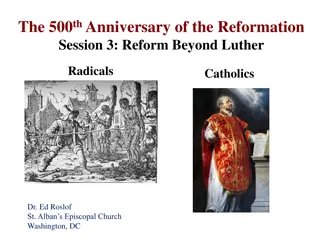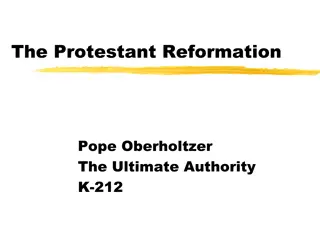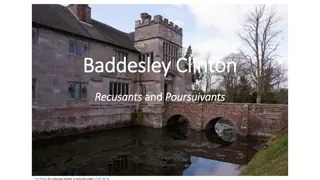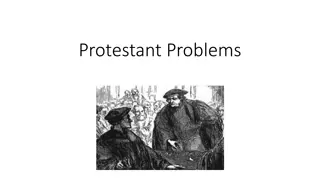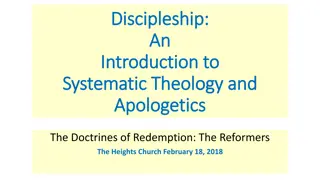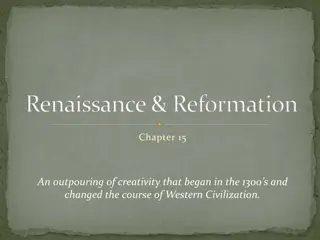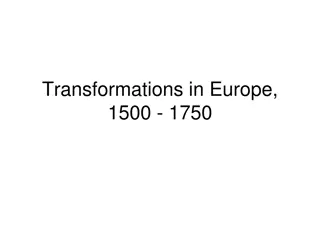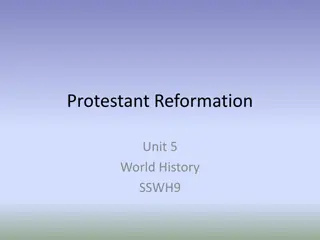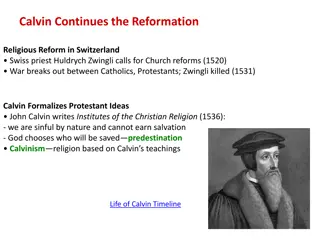Influence of Renaissance and Reformation on English Language Growth
The Renaissance and Reformation had significant impacts on the English language with changes in vocabulary, standardization of language, and spelling, influenced by Latin and religious terms. The Renaissance introduced Latin words, while the Reformation led to the translation of the Bible into Engli
23 views • 5 slides
The Protestant Reformation: Martin Luther and Key Points of Lutheranism
The Protestant Reformation led by Martin Luther in Germany during the 16th century was a religious movement that challenged the authority of the Catholic Church, giving rise to Protestant Churches. Luther's 95 Theses criticized the sale of indulgences and initiated reforms. Key causes included cleri
8 views • 16 slides
Influence of Renaissance and Reformation on English Language Growth
The Renaissance, starting in Europe, and followed by the Reformation, had significant impacts on the growth of the English language. The influx of Latin words, changes in vocabulary, growth of a standard language, and establishment of new coinages are some key outcomes. The Reformation, in particula
23 views • 5 slides
Counter- or Catholic Reformation?
The debate surrounding the Catholic Reformation questions whether it was a self-initiated response to internal factors or a reaction to the Protestant Reformation. Historians differ on when reform truly began, with some arguing it started before Luther. Key questions include whether the Catholic Chu
9 views • 18 slides
Hermeneutics and the Reformation: Principles and Methods
The Protestant Reformation aimed to reform the Church by emphasizing biblical teachings over church tradition. It challenged the authority of the Roman Catholic Church and upheld principles such as Sola Scriptura, Sola Fide, Sola Gratia, Solo Christo, and Soli Deo Gloria. These principles emphasized
1 views • 31 slides
The Impact of the Reformation on European History
The Reformation brought significant changes to theology, religious institutions, and culture in Europe. Reformers like Martin Luther and John Calvin criticized Catholic abuses, leading to new interpretations of Christian doctrine. The Catholic Counter-Reformation and conflicts among religious groups
5 views • 4 slides
The Reformation Parliament and the Break with Rome
The Reformation Parliament played a crucial role in enforcing the break with Rome through various key statutes, such as the Act in Restraint of Appeals in 1533. This pivotal legislation not only granted Henry VIII the power to decide marriage cases within the realm but also made a radical statement
7 views • 12 slides
The Renaissance and Reformation in Italy: A Historical Overview
The Renaissance and Reformation in Italy marked a period of rebirth and transformation between 1350 and 1550. The Italian Renaissance saw a resurgence of interest in ancient Greek and Roman cultures, characterized by urban growth, secular viewpoints, and a focus on individual ability. City-states li
3 views • 91 slides
Development of High Entropy Alloy-Based SOFC Anode for Controlled Reformation
Development and testing of a High Entropy Alloy-based Solid Oxide Fuel Cell (SOFC) anode for controlled reformation to improve thermal performance, reduce carbon deposition, and enhance durability. The project involves fabricating cells, electrochemical testing, modeling reformation rates, and scali
1 views • 32 slides
Criticisms and Challenges to the Pre-Reformation Church
Various forms of anti-clericalism and criticism were directed towards the pre-Reformation church. Hieronymous Bosch's "The Haywain" and Chaucer's Canterbury Tales depict cynicism towards corrupt church officials. The Richard Hunne case highlighted Erastian anti-clericalism, while Simon Fish's "A Sup
5 views • 22 slides
Henrician Reformation of 1536-47 - Overview of Key Terms and Influences
The Henrician Reformation of 1536-47 was a period of religious change in England, involving shifts in beliefs, worship practices, and organizational structures. This reform was driven both from above, by rulers imposing changes, and from below, with support from ordinary people. Key terms such as Re
3 views • 24 slides
European Renaissance and Reformation: A Time of Innovation and Transformation
The European Renaissance and Reformation period from 1300-1600 was a time of significant change and progress in art, learning, and religion. The Renaissance brought about a rebirth in art and human potential, with a focus on secular achievements and the support of patrons. Meanwhile, the Reformation
3 views • 29 slides
Reformation and Counter-Reformation in the Catholic Church
Catholic rules during the Middle Ages granted immense power to the Pope, sparking dissent that led to the Protestant Reformation. The Counter-Reformation was the Catholic response to Protestant criticisms, leading to the Council of Trent in the mid-16th century to reaffirm Catholic doctrines and pra
18 views • 14 slides
The Tudor Dynasty (1485-1603): Key Events and Figures
The Tudor Dynasty (1485-1603) marked significant events in English history, including the rise of the powerful English naval fleet, acquisition of colonies, birth of the mercantile bourgeoisie, break with the Catholic Church, and spread of the Reformation spirit. Economic changes saw the transition
1 views • 5 slides
Key Players and Events in the English Reformation
Explore the key figures and events that shaped the English Reformation, including Henry VIII, Cromwell, Cranmer, and Anne Boleyn's roles in the break with Rome. Analyze the significance of Katherine of Aragon's refusal to accept divorce, Cromwell's influence, and Henry VIII's desires. Evaluate why A
2 views • 6 slides
The Protestant Reformation and Its Impact on the Church
The Protestant Reformation was a period of religious upheaval in the 16th century, marked by criticism of the Roman Catholic Church's practices and beliefs. Martin Luther challenged the church by advocating salvation through faith alone and rejecting certain traditional practices. John Calvin emphas
1 views • 16 slides
The Reformation: Beyond Luther and the Radical Reformation
Explore the Reform movement beyond Martin Luther, delving into the radical beliefs of Anabaptists and the Magisterial Reformation led by Luther, Calvin, and Zwingli. Uncover the significant differences in theology, practices, and beliefs that shaped Christianity during this transformative period. Wi
5 views • 17 slides
The Protestant Reformation and its Impact on Europe
The 16th-century Protestant Reformation was a result of humanism and intellectualism, challenging the authority of the Catholic Church. This movement led to a revolution in religious thought, shaped identities, and contributed to the development of modern democracy. Calls for reform from figures lik
1 views • 21 slides
The Tudor Dynasty: Henry VIII, Reformation, and the Creation of the Church of England
Explore the rich history of the Tudor dynasty with a focus on Henry VIII, the Protestant Reformation in Europe, and the pivotal creation of the Church of England. Learn about key events such as Henry VIII's marriages, his quest for a male heir, the beginnings of Protestantism in England, and the est
1 views • 11 slides
Diverse Perspectives on the Protestant Reformation
Exploring key events and figures of the Protestant Reformation, from the theological debates between Luther and Zwingli to Calvin's influence in Geneva. The narrative delves into the international impact of Calvinism, the Council of Trent's response, and the Elizabethan Reformation's significance. I
4 views • 10 slides
The Reformation and John Calvin: A Journey of Faith and Reform
Discover the compelling story of John Calvin and the Reformation movement, from his early life to his pivotal role in reforming the Roman Catholic Church. Explore his conversion, writings, and impact on Christian theology.
3 views • 9 slides
Challenges and Reformation in Church History
The content discusses significant challenges faced by the Catholic Church in the Middle Ages, including issues such as political power, heresy, simony, and indulgences. It then delves into the role of Martin Luther in sparking the Reformation with his 95 Theses, leading to his excommunication and th
23 views • 19 slides
REFORMATION QUIZ
The Reformation quiz delves into key historical events and beliefs of the 1500s, including discontent with the Catholic Church, indulgences, Luther's teachings, and religious reforms. Test your knowledge on simony, nepotism, papal bull, and more to grasp the significant shift from Catholicism to Pro
1 views • 21 slides
Influence of Reformation on the 13 Original Colonies
Reformation in Europe during the 15th century, led by figures like Martin Luther and John Calvin, significantly influenced the settlement and development of the 13 Original Colonies in North America. The shift away from Roman Catholicism towards Protestantism played a pivotal role in shaping the rel
4 views • 11 slides
Renaissance & Reformation: An Era of Creativity and Change
An exploration of the Renaissance and Reformation, pivotal movements in Western Civilization. Delve into the rebirth of thought, economic influences, Renaissance art, Northern Renaissance impact, and the era of reform. Discover the clash of science and religion, the influence of wealthy patrons, and
4 views • 19 slides
Theology of Grace Church: Reformed Faith and Baptist Beliefs
Foundational beliefs of Grace Church in this insightful class about Reformed faith and Baptist principles. Discover the significance of the Protestant Reformation, the essence of the church community, and the marks of a true church. Dive into the Five Solas of the Reformation and gain a deeper under
24 views • 11 slides
The Renaissance and Reformation Unveiled
Explore the transformative era of the Renaissance and Reformation, characterized by a resurgence of creativity that reshaped Western Civilization. Witness the rebirth of ancient traditions, the economic influences, the clash of science and religion, and the remarkable artistry that defined this pivo
2 views • 21 slides
Influence of Books in the Reformation Process
Explore the pivotal role of books in shaping opinions and influencing conversions during the Reformation period, along with analyzing the power of crowds and the cultural activism associated with Protestantism. Evaluate the success and failure of the Reformation through the lens of social forces and
2 views • 25 slides
Exciting Renaissance and Reformation Matching Games
Step back in time with these engaging matching games that test your knowledge of Renaissance artists, authors, reformers, and historical figures. Match the artist with their famous works, connect writings to authors, pair reformers with their descriptions, and identify the wives of Henry VIII. Explo
8 views • 6 slides
European Transformations 1500-1750: Culture, Ideas, and Reformation
Explore the significant transformations in Europe between 1500 and 1750, covering culture, ideas, religious reformation, traditional thinking, witch hunts, the scientific revolution, and the early enlightenment. Discover how these events shaped European society and influenced future developments.
4 views • 25 slides
Unveiling the Protestant Reformation: Martin Luther and the 95 Theses
Discover the roots of the Protestant Reformation led by Martin Luther, as he challenged the Catholic Church's corrupt practices and beliefs. Learn about key issues, Luther's 95 Theses, and the revolutionary impact of his ideas spreading through the Gutenberg printing press.
4 views • 19 slides
The Impact of Calvinism and Anabaptists on the Reformation
Explore the religious reforms led by Swiss priest Huldrych Zwingli and theologian John Calvin, as well as the beliefs of Anabaptists. Learn about the spread of Calvinism, the theocratic rule in Geneva, and the influence on Presbyterianism and the Huguenots. Discover the lasting legacy of the Reforma
2 views • 4 slides
Reformation Lectures and Catechism Teaching by Martin Luther
Explore the significance of Reformation Lectures at Concordia Theological Seminary and Martin Luther's emphasis on catechism teaching as a fundamental aspect of Christian education. Discover Luther's insights on discipleship, pastors' responsibilities, and the essence of catechism in shaping Christi
0 views • 16 slides
Challenging the Church: Reformation Leaders
Explore the key figures who challenged the church and sparked the Reformation, including Luther, Erasmus, Hus, Colet, Wycliffe, and Tyndale. Learn about their contributions and impact on history.
0 views • 4 slides
Swiss Reformation: Ulrich Zwingli and John Calvin in 16th Century
Explore the Swiss Reformation in the 16th century, focusing on key figures like Ulrich Zwingli and John Calvin. Learn about the political history of Switzerland, Zwingli's reform movement in Zurich, and the impact of Calvin's legacy. Discover how these historical events shaped the religious landscap
2 views • 13 slides
Renaissance and Reformation: Cultural Transformations in Europe
Explore the Renaissance and Reformation periods, characterized by a revival of classical works, humanism, and societal changes in Europe. From the rise of the Italian Renaissance and city-states to prominent figures like Petrarch, Brunelleschi, and Leonardo da Vinci, delve into the art, literature,
1 views • 60 slides
Catholic Church Reforms in the 16th Century: Response to Protestant Reformation
Explore the debate on whether the reforms of the Catholic Church in the 16th century were initiated independently or in response to the Protestant Reformation. Delve into the Counter-Reformation, the roots of reform, and the key questions surrounding the Catholic Reformation. Discover varied perspec
3 views • 18 slides
Catholic Counter-Reformation: Tactics and Impact
Explore the Catholic Counter-Reformation, where the Church responded to the threat of Protestantism using a mixture of persuasion and force. Learn about the Courts of Inquisition, the harsh punishments for heresy, and the founding of new religious orders to reconnect with believers.
0 views • 22 slides
The Spread of the Reformation Across Europe
Explore how the Reformation rapidly spread across Europe, sparked by figures like Luther, Zwingli, and Calvin. Witness key events such as the establishment of new Protestant denominations and how religious divisions shaped Europe by 1600. Learn about the Catholic Church's response with the Counter-R
3 views • 16 slides
Cultural Movements in Czech Lands: Humanism, Renaissance, and Reformation
Explore the cultural shifts in the Czech lands from 1490 to 1620 through Humanism, Renaissance, and Reformation movements. Discover the impact of figures like Shakespeare and the emergence of Humanism, Renaissance art, and the Protestant Reformation in this historical period.
0 views • 8 slides
